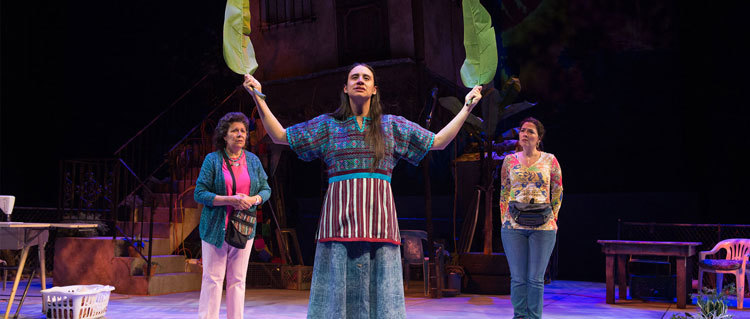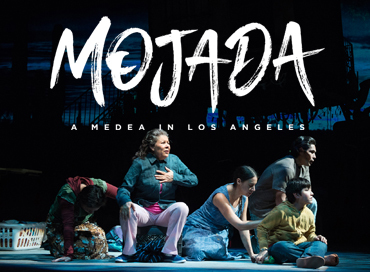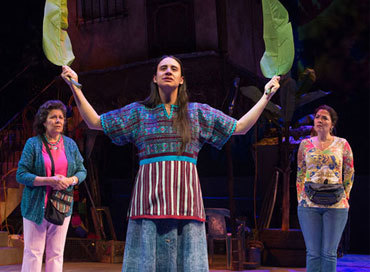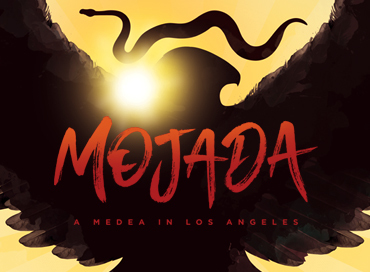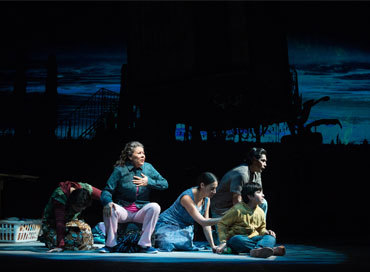The World of the Play: "Mojada: A Medea in Los Angeles"
Every Which Way But Home: Mojada’s Mythological Roots
By Benjamin Fainstein, Literary Manager
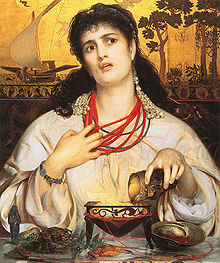
Ancient Greek mythology abounds with the names of women caught in complex moral struggles. They frequently come to dismal ends and are usually punished by the gods for their all-too-human failings. Pandora, Clytemnestra, Phaedra ... the list goes on. One name, Medea, has become synonymous with its bearer’s infamous crimes though not necessarily with the context that led to her transgressions.
Discrepancies in Medea’s story exist alongside discordant versions of what actually happened on the fateful day she fled her unfaithful husband, Jason, the Greek hero of the Argonauts. Certain details aside, the accepted circumstances of Medea’s life provide insight into the climax of her tragedy, as written by the dramatist Euripides, and illuminate some of the choices Luis Alfaro has made in crafting his contemporary adaptation, Mojada: A Medea in Los Angeles.
First and foremost, Medea was not Greek. She was a native of Colchis, a territory on the eastern shore of the Black Sea exoticized by Greek traders and colonists as a lush land of dark magic. Medea, the Colchian princess of possibly divine ancestry, was a sorceress, healer and weaver. When Jason arrived hunting for her father’s Golden Fleece, she fell in love at first sight. Many sources indicate that Medea was a puppet of the gods, pierced by Eros’ arrow so she would kill Jason’s usurper at his home in Iolcus. Medea guided Jason safely through her father’s trials for the fleece and, in most tellings, went so far as to kill her brother so he wouldn’t thwart their escape.
In Iolcus, Medea concocted a scheme to restore Jason’s birthright to him: she deceived King Pelias’ daughters into dismembering their father and boiling him into a soup. Medea and Jason then fled to Corinth, where they raised a family. Medea was ultimately disdained, however, due to Greek xenophobia that vilified “barbarian” foreigners. Jason — whether tired of his wife or seeking to restore his children to noble status within the hierarchy of Greek society — seduced his way into an engagement with the Corinthian princess, Glauce.
Facing ostracization and abandonment, the loss of her children, and the perilous state of being an unmarried foreign woman, Medea avenged herself by weaving a poisoned garment that killed the princess and the king. She confronted an aghast Jason before fleeing to Athens, and there are divergent accounts of her final act in Corinth. To preserve the impact of the ending for those unfamiliar with the myth, suffice it to say that some sources report Medea committed one of humanity’s most heinous crimes, while others say she was framed by the Greeks. Euripides took the former, more harrowing version as the ending of his play and in doing so cemented his protagonist’s legacy.
Medea, one of his early plays, heralded Euripides’ developing reputation as the iconoclastic poet of Athens with a penchant for extreme and visceral tragedies. He often broke with hallmarks of traditional Greek drama, and perhaps the biggest shift he spurred on was summed up by his elder artist: Aristotle reported that Sophocles said he himself “drew men as they ought to be, while Euripides drew them as they were.”
Medea’s fate is left uncertain at the play’s conclusion. She flies to Athens on a dragon-powered chariot to beg sanctuary. Given that Euripides’ audience were Athenians, the author leaves them with a question: What would you do with this woman and her story? Alfaro seizes on the political inquiry and profound humanity with his adaptation. His Medea is likewise a consummate outsider, who in extreme circumstances struggles to make the right choices for her family. By transposing Corinth to Los Angeles and turning Athenians into Americans, his tragedy speaks with undeniable immediacy and smolders with a fire only found when opposing moral imperatives collide and spark.
Medea’s Perilous Journey
In Mojada: A Medea in Los Angeles, Medea and her family emigrate from Michoacán, a Mexican region plagued with violence, from which half the avocados consumed in the U.S. are harvested. That billion-dollar industry is largely controlled by drug cartels who use the avocado plantations to launder money.
Leaving Michoacán is dangerous: cartel activity is enmeshed with the human trafficking circuit. Many emigrants must pay coyotes (smugglers) for help, who may not be trustworthy. The most destitute become drug mules. Amnesty International reports that more than 60% of women who cross into the United States are raped during the journey. As Luis Alfaro says, “that’s a terrible cost to pay for fleeing desperate circumstances to obtain a better life for your children.”
The word mojado/a translates literally as “wet” and is also a slur akin to “wetback” for Mexican immigrants. In the 1940s, immigrants were valued as farmhands during the bracero program, but social anxiety after World War II led to Operation Wetback in 1954. The rules for employing immigrants changed; within 10 years, more than a million Mexicans had been arrested and deported.
Alfaro’s title provocatively recalls the trauma surrounding the issue of immigration in this country. It casts a reflective shadow on Medea’s identity, while opening a dialogue about the risks unauthorized immigrants undertake.
Reading List and Additional Resources:
“Into the Beautiful North” http://www.powells.com/book/into-the-beautiful-north-9780316025263/1-18
(Non-fiction) “The Devil’s Highway” http://www.powells.com/book/devils-highway-a-true-story-9780316746717/1-5.
Research playwright Luis Alfaro:
Oedipus el Rey based on Sophocles' Oedipus Rex
Electricidad based on Sophocles' Electra
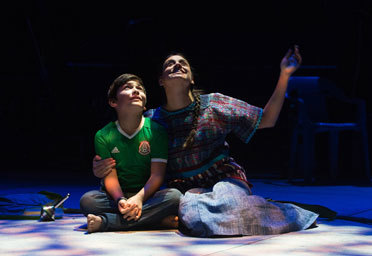
Research traditional roles of women in ancient Greece. These and other websites provide information:
Gender in the Ancient World
The Roles of Women in Ancient Greece
What are some of the characteristics of Greek tragedy?
Where did the stories for these plays generally come from?
According to Aristotle, what key characteristics does an ideal
tragic hero have? In what ways did Greek citizens relate
to and learn from a tragic hero? These and other websites
provide information:
The Basic Outline of Greek Tragedy
The Origins of Greek Tragedy
Portland Center Stage is committed to identifying & interrupting instances of racism & all forms of oppression, through the principles of inclusion, diversity, equity, & accessibility (IDEA).


